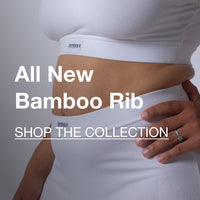Experience Vs. Identity
Gender Identity— A buzzword we often see thrown around by news sites on social media. Yes, even with all this talk about the gender spectrum, there is often a missing piece—
bringing visibility to the individuals who have unique experiences with their own gender identity. This brings us to Nick Laird, one of our incredible customers from Scotland. As our guest blogger, Nick shares the unique story of their journey through gender expression.

Throughout my life I have been asked, often by complete strangers, “are you a boy or a girl”, and it has been the most awkward, uncomfortable question, because I honestly can’t answer one or the other without feeling I’ve lost something of myself. When I was a child, the label “tomboy” was applied to me and I liked it and accepted it because it contained the word boy. I was a tomboy. There was no other word, or no other socially acceptable language to describe my gender expression. To me the word tomboy meant ‘like a boy’, and that was how I felt, like a boy, so it suited me just fine. I was not uncomfortable with my body, but I was deeply uncomfortable with the expectations, impositions and limitations that were imposed on me because of the body I had. If I was male I could express my masculinity, have my hair cropped short and I could wear trousers every day, but as a female, even these simple desires were not tolerable. As I got older I became more aware of the social implications of my gender expression. I realized that tomboyishness in little girls is considered cute, and men’s clothing on feminine women, chic and stylish, but general masculinity in a female was really not valued by anyone at all.
I knew I was attracted to women from a young age. I felt like I was the only person like me in my hometown, and maybe even the whole of Scotland, but eventually, I found out I wasn’t the only one like me in Scotland after all. It turned out there was a massive, thriving gay scene in Glasgow, my closest city, and I came out and went there full of anticipation and excitement, expecting to be able to be me, to express myself without limitations, and to meet lots of other people like me. I met lots of wonderful people and had an amazing time, but I also found that I was not just ‘coming out’: I was ‘coming in’ too. There was a rejection of so called “stereotypes”. I completely understand now that when a community does not have equal rights, labels and identity politics are necessary, even crucial, and contradictions and anomalies can be seen as a threat to the fight for equality. I came out in a time and place where lesbian and gay people did not have legal protection from discrimination, we could not have our relationships legally recognized, and we faced lots of prejudice from society. I know it’s still like this in many places in the world today, but fortunately Scotland has progressed massively over the years and, although there is still some prejudice and discrimination, it is no longer legally sanctioned.

Nick holding their original female birth certificate and new male birth certicate
When I was seventeen I fell head over heels in love with a woman and I left school, got a job and moved in with her. I felt like we would be together forever. She completely changed my life and I felt alive, significant and part of something good. The relationship lasted for seven years and when it ended I felt lost. I was twenty five years old and I had to move back home to my mum’s house and start again.
It took me a long time to get over the relationship ending, but gradually I started enjoying myself and expressing parts of my personality I felt I had suppressed before. I went to college, I cropped my hair into a crew cut, I started wearing only men’s clothing, and I made some new friends. Things were changing and I was feeling happy being single and optimistic about my future, and then I got some news that shook me to the core; my mum was diagnosed with breast cancer. She was only 43 years old.
At this time, when my mum was going through treatment, I finished college, started university and began to intensely feel like I wanted to be a man, to transition to male, to take hormones and have surgery on my breasts to create a male looking chest. My mum was devastated about losing her breasts and I was desperate to lose mine. I believed completely that my mum would recover, that everything would be fine, and I focused on transitioning. I think my mum was worried about me and I regret that she had this worry at the most difficult time of her life. She died at the age of 45.
I started taking hormones and my voice broke, my periods stopped and my body shape, skin and hair gradually changed to become visibly masculine. I enjoyed the changes and it felt right for me at that time. I felt strong and confident and full of energy. I had imagined having a perfect male chest, going swimming in shorts and wearing fitted t-shirts, but this didn’t happen. I had scars, uneven, oddly shaped nipples and a breast shape that was not symmetrical, or even masculine looking. It was not what I expected. At the time I had surgery on my chest I desperately wanted it, but I would not choose it now. I was perfect as I was.

I took testosterone injections every two weeks for eleven years and then six years ago I stopped taking testosterone and my body has changed again. Over the last six years my body shape regained its roundness and softness and lost its thick, course masculine hair, replaced by a finer, softer, lighter hair pattern. My voice will always remain broken, but it is definitely not as deep as it was when I took testosterone. The hair on my head receded, and thinned slightly on testosterone. It is thicker again, but my hairline still looks male. I think my hairline and my voice are the only two male secondary sex characteristics I have left, but they’re enough for people to read me as male. People often look twice at me, and this is not because I’m anything to look at. I think it’s because people need a second look for them to decide if I am male or female. Usually we don’t need any conscious effort to decide this.
I stopped taking testosterone because I found living as a man just as oppressive as living as a woman. And, I feel like I’m neither. I have so much respect, admiration and love for butch and tomboy women and I feel so connected to them. I feel like I am one of them. It bothers me a little when I walk past a butch woman and she doesn’t see me. I feel like saying, “hi, I’m just like you”, but I have made myself invisible to the people I most identify with. I’m not uncomfortable with my body anymore. In fact, I feel nothing but gratitude for my strong, healthy, resilient body for putting up with me. I’m forty four years old, with many imperfections and odd characteristics, but I’m okay with that. I am kind to my body now. I am trying to embrace my identity as a person with a masculine, female body and masculine gender expression. My TomboyX underwear, as well as being exceptionally comfortable, good quality and gorgeous, is kind of helping me to do that. They are perfect for me.

I don’t regret that I transitioned. It changed my life and brought many amazing experiences and wonderful people into my life. The biggest and most surprising thing that happened to me in those years was that I was attracting gay men. I met a gay man who had all of the characteristics I find attractive in human beings. He is gentle, kind, thoughtful, intelligent and creative. I would never have met Mark if I hadn’t taken testosterone. We have been together for fifteen years and we married each other two years ago. We have a beautiful, happy life together with our two dogs. I love Mark, and he loves me. Labels really are meaningless in our relationship. Mark respects me and loves me as I am. I’m not attracted to men at all anymore since I stopped taking testosterone, but I am still attracted to Mark because he is beautiful in every way to me.





